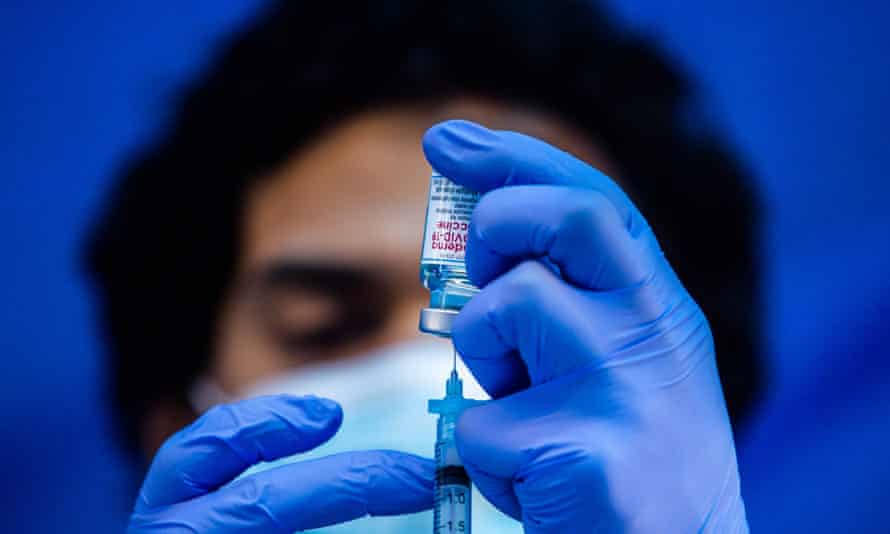Latino and Black Americans see lowest Covid vaccination rates, new data shows
"Analysis reveals just 3% of Latinos and 4.5% of Black Americans have received shots despite facing disproportionate harm from virus

Last modified on Wed 17 Feb 2021 14.02 EST
Latino and Black Americans are being vaccinated against Covid-19 at the lowest rates despite suffering disproportionately high levels of serious complications and deaths, new analysis reveals.
Only 3.5% of Latinos and 4.5% of Black Americans have so far received a vaccine shot compared with 9.1% of white Americans and 8.6% of Asian Americans, according to state figures analysed by APM Research Lab.
Indigenous Americans have the highest inoculation rate so far, with 11.6% (one in nine) already having received at least one dose. News of the relatively fast vaccination rollout in Indian Country comes shortly after the Guardian revealed that Indigenous Americans are dying from Covid faster than any other community in the US.
Analysts warn that the available data is extremely patchy due to poor reporting by many state health departments, but that the trend strongly suggests that access to the Covid vaccines has so far been inequitable.
“Unfortunately, despite the fact that we know Covid-19 has had very disparate impacts, about half of all states currently fail to provide vaccination data by race and ethnicity,” said Craig Helmstetter, managing partner of APM Research. “In the states that are providing data, Black and Latino Americans are lagging far behind Asian, white and indigenous Americans.
It was several months into the pandemic that cities and states began releasing racial and ethnic breakdowns of Covid hospitalizations and deaths. A year on, almost half a million Americans have died, yet we still do not know the ethnic background of one in 10 people killed by the virus.
The vaccination rollout got off to a very slow start in the US, hampered by the Trump administration’s inadequate preparation and logistical support for states, as well as chronic underinvestment in public health capacity. The pace has picked up, with more than 1.6m doses now being administered every day, according to the Centers for Disease Control.
Joe Biden’s national Covid strategy promises to put equity at the heart of the vaccination programme, as his team strives to meet a campaign promise to get 100m doses into arms in his first 100 days in office.
As of 12 February, only 24 states and the District of Columbia had published comparable data about the number and share of their racial and ethnic communities who have received one or both Covid-19 vaccine doses. New York and Illinois, two of the six most populous states, are among those that had not released comparable ethnicity data, making it impossible to track whether promises to ensure equitable access are being kept.
Still, the emerging data suggest that states are failing to deliver equitable access to ethnic minorities.
In Florida, just over 3% of Latino and Black residents have received at least one dose of the vaccination compared with almost 9% of white Floridians. In Texas, 2.8% of Latino residents have received a shot compared with 3.6% of Black residents, 7.2% of white residents and 9.7% of Asian American residents.
In Virginia, 30.5% of indigenous Americans have been vaccinated compared with 5.9% of Black residents and 5.3% of Latinos. Recent polls suggest vaccine hesitancy is low among indigenous Americans compared with other groups. In Washington, 18.5% of Indigenous Americans have received at least one dose compared with just 5% of Black residents, 3.1% of Latino residents and 8.5% of white residents.
Based on the current data, the District of Columbia and Pennsylvania have vaccinated the fewest Latino and Black residents.
More data and better data is needed, but analysts say that disparities in vaccination rates may be partially explained by ethnic differences in priority groups. The oldest have been prioritized by all states, and the white population is significantly older than other ethnic groups.
Since you're here ...
... we have a favour to ask. You've read in the last year. And you’re not alone. Millions are flocking to the Guardian for open, independent, quality news every day. Readers in all 50 states and in 180 countries around the world now support us financially.
With a new administration in the White House, America has a chance to reset. The pandemic has laid bare the country’s gaping inequalities, but new leadership has a historic opportunity to address the country’s deepest systemic challenges, and steer it toward a path of fairness, justice and stability.
It won’t be easy. Misinformation, white nationalism, and crackdowns on voting rights remain clear threats to American democracy. The need for fact-based reporting that highlights injustice and offers solutions is as great as ever. In 2021, the Guardian will also continue to confront America’s other longstanding problems – from the climate emergency to broken healthcare to wealth inequality.
We believe everyone deserves access to information that’s grounded in science and truth, and analysis rooted in authority and integrity. That’s why we made a different choice: to keep our reporting open for all readers, regardless of where they live or what they can afford to pay. In these perilous times, an independent, global news organisation like the Guardian is essential. We have no shareholders or billionaire owner, meaning our journalism is free from commercial and political influence."
No comments:
Post a Comment